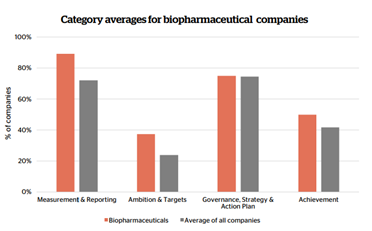EcoAct’s prescription for net-zero biopharma
The COVID-19 pandemic has increased public attention to healthcare, resulting in an increased demand for transparency in the biopharmaceutical industry. Climate-wise, the industry is carbon intensive.
According to a study published in 2019, the pharmaceutical industry’s emission intensity is about 55% higher than the automotive industry, despite its smaller size.
As a result, companies’ emission reduction pledges and net-zero commitments are given extra significance in today’s time.
Over the past decade, EcoAct, an Atos company, has analyzed the climate reporting and performance of some of the world’s largest listed companies. The 2021 report marked EcoAct’s first examination of the biopharmaceutical industry, focusing on how it responded to climate change as it adapted to the ongoing health crisis.
The pharmaceutical industry’s emission intensity is 55% higher than the automotive industry, despite its smaller size. That’s why emission reduction pledges and net-zero commitments have extra significance today.
The study analyzed four key categories of climate reporting best practices, including emissions reporting, target-setting, risk analysis and mitigation, developing low-carbon products and services, and reducing emissions. On average, the industry scored high among the average of all companies.
The sector performed well in emissions measurement and reporting and target-setting. However, despite a relatively strong performance, biopharma companies are still underperforming when it comes to setting ambitious carbon reduction targets and achieving progress against them.
- Sector scores averaged 61%, significantly higher than the overall average of 53%
- GlaxoSmithKline (GSK) led the sector with a ninth place finish in the overall rankings, while AstraZeneca ranked twelfth
- Only one biopharmaceutical company ranked among the bottom 50 companies
This performance could be attributed to a number of factors, including mandatory market regulations, future market regulation projections, and consumer and investor demands. However, a lack of low-carbon products and services appears to have hindered the overall performance, with only 38% of companies offering low-carbon alternatives — significantly less than the global average.
According to the 2020 data we examined, 75% of biopharmaceutical companies have managed to successfully reduce Scope 1 and 2 emissions in line with a 1.5°C warming pathway and 50% of them have achieved the same goal for Scope 3 emissions. It is important to note that this could be due to the far-reaching lockdown during 2020, with reductions that may not have been sustained in 2021.
Climate risks and opportunities
In the coming years, many biopharmaceutical companies will be heavily affected by climate change. In its annual report, Johnson & Johnson notes that water scarcity can significantly increase operational costs if high-quality water is not available in certain locations. This is just one of several physical risks identified by the sector, such as wildfires, flooding, storms and extreme heat. There are also concerns regarding carbon pricing mechanisms, with several companies predicting higher prices in the future. Our report reveals which biopharma companies are leading the industry in carbon reductions, renewables and science-based targets.
In 2019, we observed no pharmaceutical and biotechnology companies undertaking climate scenario analysis (or CSA), which is an assessment of climate risks against more than one future climate outcome. In 2020, we found that this number increased to 22% 76% of these companies are also assessing climate-related opportunities, which is promising; however, it suggests that a quarter of these companies are not yet prepared to mitigate risks or understand the opportunities of the low-carbon transition. The fact that only 50% are reporting climate risks as principal risks in their annual reports suggests that there is still work to be done for climate change to become a central issue.
Four actions for climate resilience
Our research has identified the lack of science-aligned targets and clear strategies for achieving net-zero emissions. As global healthcare demands continue to increase, the biopharmaceutical sector has a vital role to play in supporting the net-zero transition and future-proofing its organizations.
Here are four key actions that you can take to align with best practices and increase climate resilience:
- Make a commitment to net-zero - According to scientists, it is essential that we meet a net-zero target by 2050.
- Measure your full impact, including all material emissions - This means measuring scope 1, 2 and 3 emissions across the full value chain.
- Set both near-term and long-term science-aligned targets - With the release of the new net-zero standard by the science-based target initiative (SBTi), it is now best practice to ensure both near and long-term science aligned targets are in place.
- Invest in nature-based and high-quality offsetting solutions - Future net-zero goals will require that residual emissions be offset, but it is best practice to take responsibility for your existing climate impacts now via the purchase of carbon credits verified by recognized international standards.

To learn more about what the future holds and how these four actions can help biopharmaceutical companies adapt, achieve their net-zero goals and combat climate change, read the full research report here.
If your company is interested in working towards a carbon reduction plan, contact EcoAct today.
Topics
The Climate Reporting Performance of the DOW 30, EURO STOXX 50 and FTSE 100
Read the full research report here
